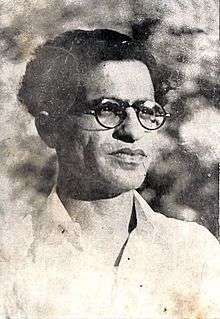Ahmad Nadeem Qasmi
| Ahmad Nadeem Qasmi احمد ندیم قاسمی | |
|---|---|
 Qasmi in May 1949 | |
| Born |
Ahmad Shah Awan 20 November 1916 Angah, Khushab District, British India |
| Died |
10 July 2006 (aged 89) Lahore, Pakistan |
| Pen name | Nadeem |
| Occupation | Urdu poet, journalist, writer, scholar |
| Nationality | Pakistani |
| Ethnicity | Punjabi |
| Citizenship | Pakistan |
| Education | Bachelor of Arts (BA) degree from the Punjab University, Lahore, Pakistan |
| Alma mater | Sadiq Agerton College Bahawalpur |
| Genre | Poetry, Afsana |
| Literary movement | Progressive Writers Movement |
| Notable works |
Total 16 books of short stories Chaupaal Bagoolay Taloo-o-gharoob Sailab-o-gardab Anchal Aas paas Dar-o-deewar Ghar se ghar tak Kapas ka phool Barg-e-hina Aablay Bazar-e-hayat Sannata Neela pathar Koh pema Pat jhar Total 10 books of poetry Rim Jhim Jalal-o-jamal Showla-e-gul Dasht-e-wafa Dawam Muheet Loh-e-khaak Baseet Jamal Arz-o-sama |
| Notable awards |
Pride of Performance (1968) Sitara-i-Imtiaz (1980) |
| Spouse | Rabia Nadeem |
| Children |
Naheed Qasmi Nishat Nadeem Nauman Qasmi |
|
| |
| Signature |
 |
Ahmad Nadeem Qasmi (Urdu: احمد ندیم قاسمی) born Ahmad Shah Awan(Urdu: احمد شاہ اعوان) on 20 November 1916 – died 10 July 2006,[1][2] was an Urdu and English language Pakistani poet, journalist, literary critic, dramatist and short story author.[1] He wrote 50 books on topics such as poetry, fiction, criticism, journalism and art,[1][2] and was a major figure in contemporary Urdu literature.[2][3] His poetry was distinguished by its humanism,[1][3] and his Urdu afsana (novel) work is considered by some second only to Prem Chand in its depiction of rural culture.[1] He was also editor and publisher of the literary magazine Funoon for almost half a century.[1][2] He received awards such as the Pride of Performance in 1968 and Sitara-e-Imtiaz in 1980 for his literary work.[1]
Personal life
Background
Qasmi was born in the village of Anga(Danga) in Khushab District, British India.[1][2] He graduated from a high school in Campbellpur, now renamed Attock city in 1931, around the time when he wrote his first poem.[1][2] Later he studied at Sadiq Egerton College in Bahawalpur. He graduated from the University of the Punjab, Lahore in 1935.[1][2] He had a brother, Peerzada Mohammad Bakhsh Qasmi, and a sister. He became an active member of the Progressive Writers Movement as a secretary, and was consequently arrested many times during the 1950s and 1970s.[1] He died on 10 July 2006 of complications from asthma at Punjab Institute of Cardiology in Lahore.[1][2]
Literary career
Qasmi had a long career as a writer and editor. He edited several prominent literary journals, including Phool, Tehzeeb-i-Niswaan, Adab-i-Lateef, Savera, Naqoosh, and his own journal, Funoon.[1] He also worked as the editor of the Urdu daily Imroze.[1] Qasimi contributed weekly columns to national newspapers like Rawan Dawan and Daily Jang for several decades.[1] His poetry has included both traditional ghazals and modern nazms.[4]
In 1948, he was selected as the secretary general of the Anjuman-e-Taraqqi Pasand Musannifeen (Progressive Writers Movement) for Punjab.[1] In 1949, he was elected the secretary-general of the organisation for Pakistan.[1] In 1962, Qasmi published his own literary magazine Fanoon, with the support of writers and poets including Khadija Mastoor, Hajra Masroor, Ahmed Faraz, Amjad Islam Amjad, Ata ul Haq Qasmi, Munnu Bhai and Nazir Naji. Qasami was the mentor of poet Parveen Shakir.[1] In 1974, he was appointed secretary-general of Majlis-Taraqee-Adab, a literary body established by the government of West Pakistan in 1958.[1]
His literary work has been appreciated and admired by Urdu writers, poets and critics,[3] although there is also criticism of his literary work and of his personality.[5]
An example of Qasmi's writing style is:
Dawar-e hashr! mujhe teri qasam
Umr bhar mein ne ibadat ki hay
Tu mera namaa-e-amaal tau dekh
Mein ne insaan se mohabbat ki hay[1]
A translation is:
O Lord of the Day of Judgment
I swear by you
I have worshipped all my life
Look at my balance sheet
I have loved mankind[1]
Bibliography
Poetry
- Jalal-o-Jamal
- Shola-i-Gul
- Kisht-i-Wafa
Short story
- Chopaal
- Gandasa
- Sannata[6]
- Kapaas ka Phool[6]
- Aabley[6]
- Tuloo-O-Gharoob
- Sailab-o-Gardab
- Anchal[6]
- ghar se ghar tak
- Nila-pathar[6]
- Dawam-dar-o-deewar[6]
- Bazar-e-hayat[6]
- Aas-paas[6]
- Jhoota
See also
References
- 1 2 3 4 5 6 7 8 9 10 11 12 13 14 15 16 17 18 19 20 21 "A Tribute: Ahmed Nadeem Qasmi (1916–2006)". Pakistaniat.com. 16 August 2006. Retrieved 28 March 2016.
- 1 2 3 4 5 6 7 8 http://mazhar.dk/film/artists/details.php?pid=4594, Biography of Ahmad Nadeem Qasmi on Pakistan Film Magazine website, Retrieved 28 March 2016
- 1 2 3 "Ahmad Nadeem Qasmi remembered". Pakistan Today.com.pk newspaper. 16 December 2011. Retrieved 28 March 2016.
- ↑ http://archives.dailytimes.com.pk/national/16-Dec-2005/ahmed-nadeem-qasmi-awards-for-2003-4, Ahmad Nadeem Qasmi's Awards for 2003 and 2004 on Daily Times newspaper, published 16 Dec 2005, Retrieved 28 March 2016
- ↑ "NON-FICTION: Ahmed Nadeem Qasmi: the controversy lives on". Dawn.com newspaper. 21 August 2011. Retrieved 28 March 2016.
- 1 2 3 4 5 6 7 8 http://aiourdubooks.com/?s=Ahmad+Nadeem+Qasmi+, Retrieved 28 March 2016
External links
- BBC "Pakistan literary giant is dead" 10 July 2006, Retrieved 28 March 2016
- Ahmed Nadeem Qasmi: The Story Teller, Retrieved 28 March 2016
- Ahmad Nadeem Qasmi passes away, Dawn, Karachi newspaper, published 11 July 2006, Retrieved 28 March 2016